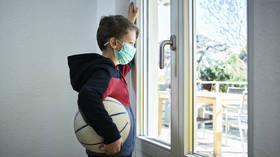The cruelties we have inflicted on children under Covid-19 are unethical and immoral, we’re devastating a whole generation

A year of lockdowns, mask-wearing, isolation and depriving youngsters from seeing friends and grandparents has caused a surge in kids committing suicide, self-harming and suffering other mental health issues. It needs to end.
Scrolling through Twitter the other day, I came across a tweet about a worrying increase in the numbers of children and youths having suicidal thoughts.
It mentioned that Boston Children's Hospital had reported a 47% increase “in kids needing to be hospitalized for suicidal ideation or attempts,” between July and October 2020 compared to the same period in 2019.
So I started to research, and in doing so tried to contact organizations concerned with the mental health of young people.
One UK suicide prevention organization that I emailed for information on the correlation between lockdown restrictions and the rise in child (and adult) suicides instead played down the effects of lockdowns and warned against writing about children being affected.
Its media spokesperson told me: “We’re really keen to avoid any media narratives that suggests that suicide is an inevitable consequence of the pandemic and its restrictions, as this can be harmful to vulnerable readers and induce a sense of hopelessness during these uncertain times.”
Also on rt.com ‘Zero Covid’ may sound ideal, but it’s utopian, fanciful, authoritarian nonsense. Is that why so many lefties love it?Although I am not saying suicide is an inevitable consequence of Covid-19 restrictions, clearly there are strong correlations between a year of lockdowns, isolation, depriving children from seeing friends, classmates and grandparents, making them wear masks and other measures, and a sharp rise in child suicides, self-harm and increased mental health issues in general.
The UK organization (whose name I will leave out because, while I am critical of their perspective on these issues, I don't want to tarnish their reputation for the possibly life-saving work they otherwise do), deflected on the matter of the correlation, saying:
“Currently there is no evidence of a national rise in suicide rates, real-time data is not yet available to determine the true impact on particular population groups or geographic areas.”
But that simply is not true.
As was reported in January 2021, the UK Centre for Mental Health revealed, “500,000 children under 18 in England, with no previous problems, will need mental health care due to the devastating economic, health and family pressures caused by the ongoing coronavirus crisis. This has manifested itself in children as young as five reporting self-harm and suicidal thoughts to counsellors and a tripling in the number of eating disorders reported by adolescents.”
An article the following month, citing a UK doctor's diary, revealed: “Children in mental health crisis used to be brought to A&E about twice a week. Since the summer it’s been more like once or twice a day. Some as young as 10 have cut themselves, taken overdoses, or tried to asphyxiate themselves.”
The rise in children committing suicide, having suicidal thoughts and self-harming is happening around the world. A December 2020 report by the American Academy of Pediatrics found, “a significantly higher rate of suicide ideation in March and July 2020 and higher rates of suicide attempts in February, March, April, and July 2020, as compared with the same months in 2019.”
A January 20, 2021 article cited the executive director of the Youth Services Bureau of Ottawa as saying, “We’re seeing about a 30-40 percent increase in those who are contacting mental health crisis services. We’re seeing a doubling of the calls that are young people calling or their family is calling because they’re worried about suicide.”
A UNICEF Canada March 2021 press release noted: “The COVID-19 pandemic and the lockdowns that have disrupted every aspect of a child and young person’s childhood is a grim reminder of the sacrifices made by young people over the last year. For children experiencing violence, neglect or abuse at home, lockdowns have left many stranded without the support of teachers, extended families and communities.”
A March 15 article on the McMaster Children’s Hospital in Hamilton, began, “Pandemic safety measures have had a negative impact on some aspects of children’s and teens’ health.”
It cited a threefold increase of youths admitted for medical support after a suicide attempt, with youngsters reporting a “lack of social interaction, increased conflict at home, and the inability to rely on friends as main contributors” as factors contributing to their plight.
The article also noted an increase in substance abuse admissions (“doubled compared to last year”) and “unprecedented” rates of eating disorders, with referrals up “90% in a four month period, compared to last year.”
In France, doctors have reported children as young as 8 years old, “deliberately running into traffic, overdosing on pills and otherwise self-harming.”
The same article said that a doctor working in a northern England infirmary “used to treat one or two children per week for mental health emergencies, including suicide attempts. The average now is closer to one or two per day, sometimes involving children as young as 8.”
In March, the Foundation for Economic Education published an article that stated: “When it comes to lockdowns, we’ve extensively documented the unintended consequences at FEE, including isolation, depression, suicidality, unemployment, drug abuse, domestic violence, and more.”
The evidence is overwhelmingly clear: there is a serious rise in child suicide, suicide attempts and thoughts, self-harm and mental health issues that can be attributed directly to the result of Covid-19 measures enforced on children, including many with no previous history of mental health issues.
Also on rt.com Scientists warn vaccinations alone won’t contain UK Covid infections, as UK eases lockdown – studyLifting lockdown measures would help children heal
The lockdowns are based both on the premise that they are necessary in order to “flatten the curve,” as was said one year ago, and to protect people.
Now (goalposts moved), they are apparently needed until everyone is vaccinated (with rushed vaccines that have raised concerns they may cause blood clots or deaths).
The different stages of lockdowns are largely based on the incessant reports of rising “cases” of Covid-19.
Cases are determined by Covid-19 tests, which have proved to be unreliable and inaccurate, giving false positives and creating a false picture of reality. This faulty testing is exacerbating the media hype over “rising cases.”
Even Ontario's associate chief medical officer of health in July 2020 admitted, “... if you're testing in a population that doesn't have very much Covid, you'll get false positives almost half the time. That is, the person actually doesn't have Covid, they have something else, they may have nothing.”
Or as noted in December 2020, even the World Health Organization, “released a guidance memo on December 14th, warning that high cycle thresholds on PCR tests will result in false positives.”
The 24/7, sensationalist media we have been subjected to for the past year is a major cause for anxiety, fear, depression and hopelessness.
Talking honestly about the negative impacts of lockdowns, isolation, masking and the resulting mental health issues is something we need to be doing.
A Canadian initiative, Save Our Youth, has produced a series of short videos of parents speaking about how lockdowns are affecting their children. The coalition encourages others to submit their own clips.
Journalist Robert Bridge recently wrote: “Children have been taught to look at each other warily, like walking chemical factories capable of infecting and even killing, as opposed to fellow human beings that can provide love, comfort and support.
“We did the most unconscionable thing imaginable, forcing young children – at the most momentous times of their lives – to adhere to social distancing rules while shutting down their schools and imprisoning them in their homes. That is simply cruel and unusual punishment. In a word, it is child abuse.”
The UK suicide prevention organization which deflected the correlation between lockdowns and rising child suicides and self-harm does children a disservice with its stance.
The lockdowns and related measures are, in my and many others' opinions, the core reasons for childrens’ suffering. The sooner we return to normal and lift lockdowns and end the masking of children, the sooner our young will start to heal and live in ways beneficial to their physical and mental health.
I do, however, agree with the organization's guidance to “remind people that suicide is preventable by encouraging help-seeking and including sources of help.” And for parents and loved ones to pay close attention to any changes in behaviour in children (or adults) who might be silently suffering.
Recently, the editor of the Toronto Sun said: “Keeping children under lockdown so much in quarantine, not letting them just interact with their natural environment as much as they would normally be doing is actually going to stand a risk of harming their immune system, develop allergies, asthma, and even autoimmune diseases later in life because they're not having a natural exposure to to the microbial atmosphere out there.
“It's unethical, it's immoral, to ignore the harms that are being done to our children to the degree that we are ignoring them as a society.”
I wholeheartedly agree. We should be doing everything we can to protect children from lockdowns, potentially toxic masks, isolation and the spiralling mental health issues that result from them.
Think your friends would be interested? Share this story!
The statements, views and opinions expressed in this column are solely those of the author and do not necessarily represent those of RT.
















